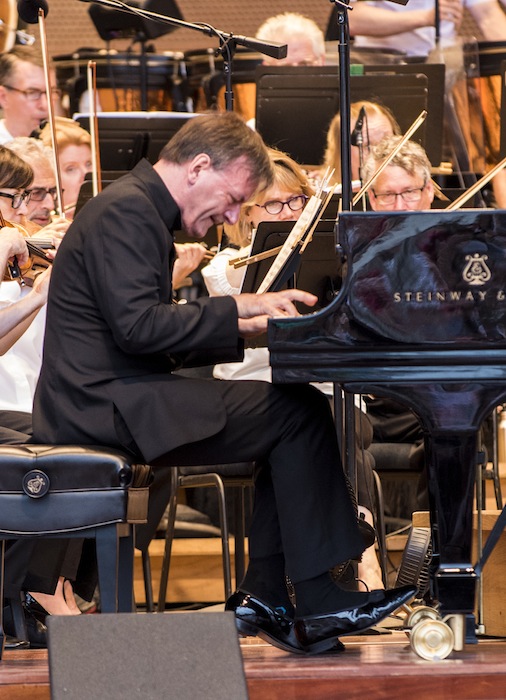Hough brings power, poetry to Brahms with Kalmar, Grant Park Orchestra

Feast or famine. Local performances of Brahms’ Piano Concerto No. 1 have been scant in recent seasons compared to the composer’s more popular Second Piano Concerto. Yet in March Nikolai Lugansky performed it here with the St. Petersburg Philharmonic, and Yuja Wang played the same work just two weeks ago at Ravinia’s CSO opener.
Wednesday night it was the turn of Stephen Hough with the Grant Park Orchestra at the Pritzker Pavilion. Carlos Kalmar was on the podium, back to lead the final four weeks of the lakefront festival season.
While Brahms’ Second Piano Concerto is imbued with a relaxed, glowing lyricism, the First Concerto–written at age 25–is a work of youthful fire and intensity. Symphonic in scope, the First Concerto opens with a turbulent orchestral introduction followed by eruptive, almost violent outbursts from the solo pianist amid respites of uneasy calm.
Stephen Hough has become one of the Grant Park Music Festival’s most popular guest artists, and his inspired Brahms performance showed once again the British pianist’s singular blend of interpretive intelligence and unbridled excitement.
Hough held the ebb and flow of the expansive opening movement in a skillful balance, seamlessly segueing from the dramatic keyboard passages to the more ruminative music. In the Adagio, Hough conveyed the searching, stoic expression with notably free phrasing and rubato. The finale provided the requisite payoff with the sturm und drang morphing into insistent optimistic energy, Hough ratcheting up the edgy virtuosity to a blazing coda.
Kalmar was a full partner in this most orchestral of concertos, drawing storm-tossed tuttis in the opening movement as well as strikingly hushed and tender playing in the Adagio. A wavery flute apart, the Grant Park musicians provided a rich and supportive backdrop for Hough with especially refined and evocative horn solos by Jonathan Boen.
Brahms often drew on Hungarian folk music in his music, most notably in the finales of his Violin Concerto and Piano Quartet in G minor, and that inspiration made up the rest of Wednesday’s program.
Like Bela Bartok, Zoltan Kodaly was an inveterate field researcher and advocate for the music of his native Hungary, and that folk influence is richly manifest in Kodaly’s Dances of Galanta. Kalmar brought out the humor and lyric affection of the contrasted themes as well as the whirling dynamism with superb playing from the orchestra. The woodwinds were especially inspired, particularly Gene Collerd’s febrile, sinuous clarinet solo.
Continuing the Magyar theme, Kalmar closed the evening with a triptych of Brahms’ Hungarian Dances. Originally written for four-hand piano, the composer orchestrated just three of the 24 dances himself (Nos. 1, 3 and 6) and these were the ones performed Wednesday.
Kalmar and the Grant Park musicians served up swaggering, full-blooded renditions of these tuneful miniatures, the conductor teasing out the rubato and putting across the rustic charm of Dance No. 3 as surely as the whirling brilliance of 1 and 6.
Carlos Kalmar and the Grant Park Orchestra and Chorus perform Mozart’s “Linz” Symphony (No. 36) and Frank Martin’s oratorio In terra pax 6:30 p.m. Friday and 7:30 p.m. Saturday at the Pritzker Pavilion. gpmf.org
Posted in Performances





Posted Jul 31, 2017 at 6:57 pm by Mike Miller
Kalmar,Hough,and Brahms:an unbeatable combination.
Magnificent-Bravo!